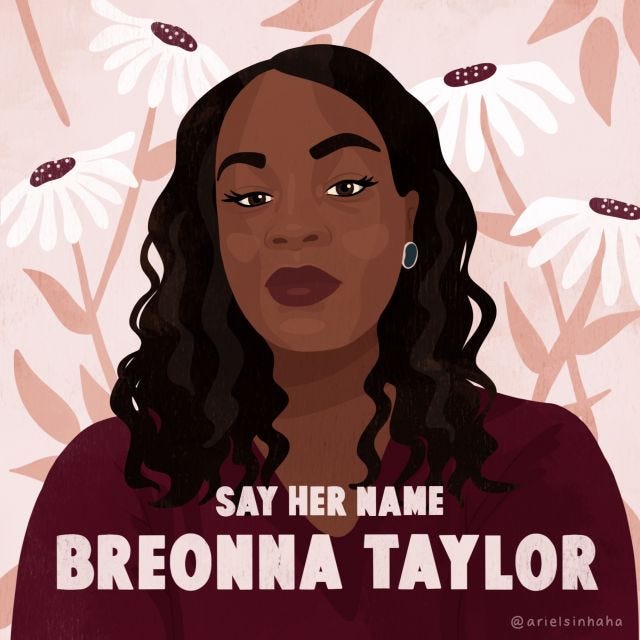Lady Business: Racist pandemics and the pandemic of racism; Breast-implant results
Hello, and welcome to Lady Business, a newsletter about women, the business world, and all the ways they overlap. You can sign up for Lady Business and read previous issues here. This is the 103rd issue, published June 7, 2020.

Black Lives Matter
He had survived contracting the coronavirus two months earlier. She was a first responder in the early days of the pandemic, not yet 27. He was out for a run, now the only regular change of scenery and better mental health available to so many in quarantine.
I’ve written a lot recently about the personal tragedies happening amid the bigger apocalypse, but that understates the scope of the overlapping and related disasters we’re all currently living through. Some very much more than others: Black Americans are dying from Covid-19 at a disproportionately high rate, are more than twice as likely to die from police shootings as white people, and in general have a lower overall life expectancy.
The disaster was already here, for centuries. “This has been happening forever,” as Crystal Ashby, CEO of The Executive Leadership Council, put it during a Fortune Most Powerful Women event this week. “Racism has been a pandemic, and we have allowed it to embed itself in our society."
I’ve spent much of the last few months reporting on a sliver of the failures in the healthcare system, but there are so many more. Many of them have long caused sweeping, inexorable tragedies for black and brown people, as my colleague Sy Mukherjee wrote this week:
Bernard Tyson, the late CEO of Kaiser Permanente, was an evangelist of the concept that societal inequality has led to different health outcomes for communities of color—the social determinants of health.
Living in an environment where the air you breathe is poisoned or where poverty restricts your access to healthy food or where it takes hours to get to a hospital can cut years off of your life, according to this theory. It's a complicated science but one worth considering in this moment.
It shouldn’t take a global pandemic -- or the horrific final nine minutes of George Floyd’s life; or the police shooting that ended Breonna Taylor’s; or the vicious attack that ended Ahmaud Arbery’s -- to pay attention to the depths and enduring nature of these problems. It shouldn’t take national protests for everyone at every rung of power to try harder to fix them.
But the top rungs of that power are still firmly controlled by white people -- in government, in business, in the newsrooms and op-ed pages that are supposed to afflict the comfortable and comfort the afflicted. (Hey, “buildings matter, too.”) And all the diversity and inclusion efforts in the world don’t matter if the people at the top aren’t willing to see those efforts through to their logical conclusions, by giving up more of their powerful roles to people of color -- and if white people in general aren’t willing to cede our power to those for whom solving the pandemic of racism isn’t just a matter of principle, but of survival.
Some Good News
Speaking of that sliver of the healthcare system I’ve spent the last few months reporting on, I was excited and gratified to see my reporting get some results this week: Two weeks after Fortune published my investigation into the problems with breast implants, the U.S. Food and Drug Administration asked Allergan to find tens of thousands of women with the implants it recalled almost a year ago.
Those implants, as I reported, have been linked to a cancer of the immune system and the deaths of at least 34 women. And there’s still a lot of work to be done; in its announcement Monday, Allergan also said it doesn’t have device-tracking information on at least 52,000 of the implants it recalled.
Lady Bits
--"The notion that there is one kind of person who can be objective because that person is the ‘default’ is, first, untrue and, second, an idea that has been used and weaponized in bad faith against journalists from other backgrounds for a long time.” Texas Tribune editorial director Stacy-Marie Ishmael, and seven other accomplished black women journalists, on the struggles both immediate and systemic of reporting while black.
--"This … reinforces an already pernicious literary divide that books written by or about minorities are for educational purposes, racism and homophobia and stuff, wholly segregated from matters of form and grammar, lyric and scene. Perhaps better to say that in the world of the anti-racist reading list genre disappears, replaced by the vacuity of self-reference, the anti-racist book, a gooey mass.” Lauren Michele Jackson on the limits of the anti-racist reading list.
Thank you for reading, commenting, and subscribing to this newsletter! Please tell your friends to sign up here, let me know what you think about this week's issue, and what else you'd like to see me write about: maria.aspan@gmail.com

